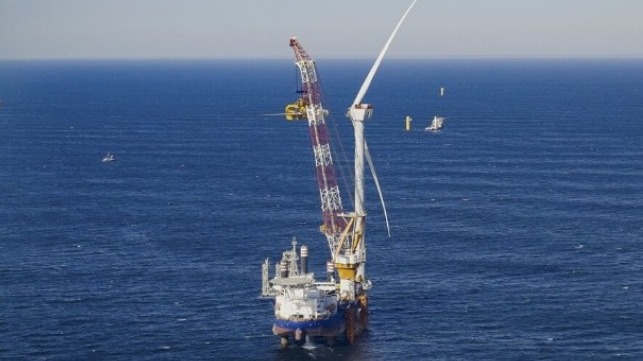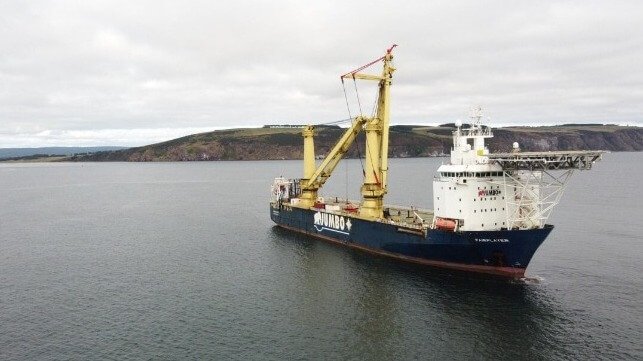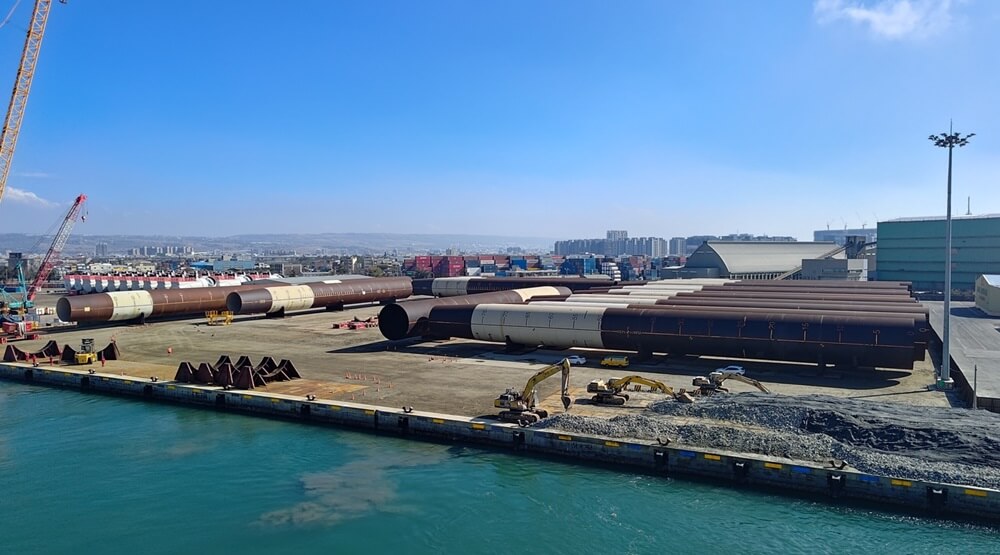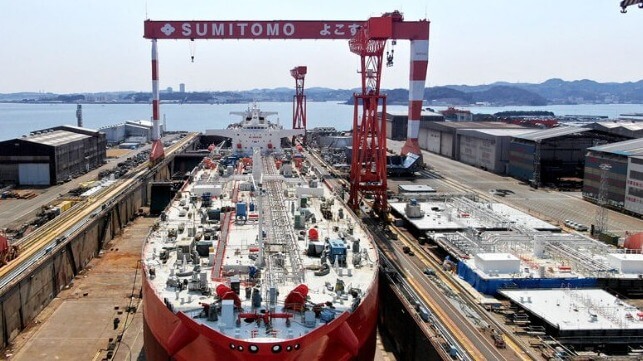Eversource Exits Offshore Wind by Selling Ørsted JVs to Private Equity Firm

Eversource Energy, the operator of New England’s largest energy delivery system, executed a definitive agreement to complete the exit from its large investment in the developing U.S. offshore wind energy sector through a joint venture with Ørsted. The deal would sell the 50 percent stake to a private equity manager, Global Infrastructure Partners, which in turn is being acquired by BlackRock, one of the world’s largest private asset managers.
The agreement calls for GIP to acquire Eversource’s 50 percent share in the 132 MW South Fork Wind project which is currently nearing completion and the 704 MW Revolution Wind project which received final federal approvals in November 2023 and is moving into the construction phase. South Fork is under contract to provide power to New York State, while Revolution Wind will split its power between Connecticut and Rhode Island.
Eversource expects to realize $1.1 billion of cash proceeds for the deal which will largely remove it from these projects. There are certain clauses to adjust the final price based on tax credits and potential construction cost overruns and Eversource will retain some obligations including for example onshore work for Revolution Wind.
The company had previously announced that while it believes in the potential for offshore wind energy production, its strategy would focus on its operations as a regulated transmission builder and operator.
Ørsted highlights that it has a longstanding partnership with Global Infrastructure Partners. The two companies currently have four strategic joint ventures. GIP is seen as a strong partner for these two additional late-stage wind projects, which are among the first in the U.S. to be moving into construction and completion. The deal also raises the potential that Ørsted will be in partnership with BlackRock which in January 2024 announced plans to acquire GIP. BlackRock has also shown interest in the offshore energy sector, although it is currently in a dispute with Taiwanese regulators who raised concerns about the investment manager.
This is the latest in a series of transactions announced by Eversource as part of its exit strategy from the offshore wind sector. The company in January 2024 entered into a deal to sell its 50 percent stake in the 924 MW Sunrise Wind project. Ørsted would acquire the position if it is successful in resetting the power agreements with New York State which it rebid in the recently closed solicitation. Ørsted has indicated it would proceed with 100 percent ownership of the project if it wins an agreement with New York State, or otherwise the two companies would look to other alternatives for Sunrise Wind.
Eversource in 2023 also sold its 50 percent interest in an uncommitted offshore lease to Ørsted. They received $625 million for the interest in the 175,000-acre site which could be developed into another wind farm project.
The sale to GIP will require federal and New York State approval. They expect South Fork Wind will complete construction and be fully operational before the closing, which is expected in mid-2024.
Jumbo Secures Unique Contract to Remove Offshore Wind Monopiles

Jumbo Offshore has secured a unique contract to remove wind turbine monopiles from the site of the future Yunlin Wind Farm, a 640 MW project in the Taiwan Strait.
Yunlin was scheduled to generate its first power in 2020, but its progress was disrupted by the pandemic. It is also reported to have encountered difficulties with monopile installation, with several piles slipping. The project's first monopile installation contractor, Sapura Energy, backed out in February 2022. The second, UAE-based NPCC, took over in April 2022. A third contracting consortium, Fred. Olsen/Shimizu, now holds a contract for the remaining monopile installation scope and is scheduled to start this quarter.
As of early January, the project partners said that they have installed 45 out of 80 monopiles and completed 34 out of 80 turbines.
Throughout the project, Jumbo has supported Yunlin's developers with heavy-lift capabilities. Beginning in 2021, Jumbo's fleet transported 40 monopiles, 120 monopile sections and 40 transition pieces to Taiwan - the largest contract in the company's history.
 Courtesy Jumbo
Courtesy Jumbo
As construction continues, Yunlin needs to remove some of the monopiles installed earlier in the project, and has awarded Jumbo a contract extension to cover this additional scope. The heavy lift vessel Fairplayer will take out monopiles that were installed during a previous phase.
To undertake this task, the vessel will be fitted with an underwater abrasive cutting and lifting tool and an ROV. Using this special-purpose rig, the monopiles will be cut into sections, hoisted on board and transported back to shore. According to Jumbo, the objective is to cut off the bottommost section of each monopile three meters below mean seabed level.
“We are very proud to have been awarded this additional scope of work on the Yunlin OWF project. We see this as a confirmation that Jumbo’s values bring real benefit to our clients. With our client-centric approach, we aim to cooperate with our customers as a partner in all that we do, in order to offer a reliable service that inspires confidence," said Brian Boutkan, Manager Commerce at Jumbo Offshore.
Yunlin's developer is Yunneng Wind Energy, a joint venture of TotalEnergies, Skyborn Renewables, Thailand's Electricity Generating Public Co. (EGCO) and Sojitz Corp. Yunneng received government approval for a $3 billion debt restructuring plan in January, paving the way for completion of construction.
Sumitomo Ends Commercial Shipbuilding as It Looks to Offshore Wind

In a further demonstration of the stiff competition in shipbuilding and the declining position of the Japanese industry, Sumitomo Heavy Industries Marine & Engineering Company (SHI-ME) reports its board adopted a resolution to withdraw from building new general commercial vessels. One of the oldest shipbuilders in Japan, the company will continue its ship repair business while it also looks to transition to realize opportunities in offshore wind power generation.
“Anticipating the necessity to address the rising prices of steel and other materials and equipment, along with significant fluctuations in vessel prices, and persisting intense competition with overseas companies due to an increasing supply-demand gap, we have extensively deliberated on the future of the shipbuilding business together with SHI-ME,” the company wrote in its statement.
The shipbuilder was spun off in 2003 into an independent company that sought to create its competitive position as a top player in the mid-size tanker market, and specifically focusing on Aframax tankers. They cite the prolonged down cycle for tankers and competition as well as developments such as the 2008 bankruptcy of Lehman Brothers as contributed to the challenges for shipbuilding.
The company implemented various measures, including limiting the number of vessel orders it accepted and overhauling its shipbuilding system, but still, they reported it was challenging to sustain the shipbuilding business. Orders in the last fiscal year were reported at $113 million.
The plan calls for completing the current orders as well as continuing to provide after-sales service for previously constructed vessels and the repair business. As part of the mid-term management plan, they will also work to commercialize opportunities for base structures for offshore wind power generation along with related vessels.
The shipbuilding business traces its origins to 1897 and has operated in its current form since the 1969 merger of Sumitomo Machinery Industries and Uraga Heavy Industries formed Sumitomo Heavy Industries, a machinery and shipbuilding manufacturer. The Yokosuka Shipyard, which has one of the largest docks in Tokyo Bay has operated in its current form since the 1960s.
The company is taking a charge of $5.5 million in the 2023 financial reports for a loss on the business liquidation. They said that revenues would be stabilized by reassigning personnel and other forms of management resource reallocation. The portion of the shipyard used for new construction will be transferred to the Sumitomo Construction Machinery Company which looks to build hydraulic excavators at the site.
Japan’s shipbuilding industry has been in a prolonged decline losing market share to the growing competition first from South Korea and later from China. Today, Japan is a distant third in the industry rankings largely supported by Japanese shipowners who continue to commit a portion of the contracts to the domestic industry.
No comments:
Post a Comment